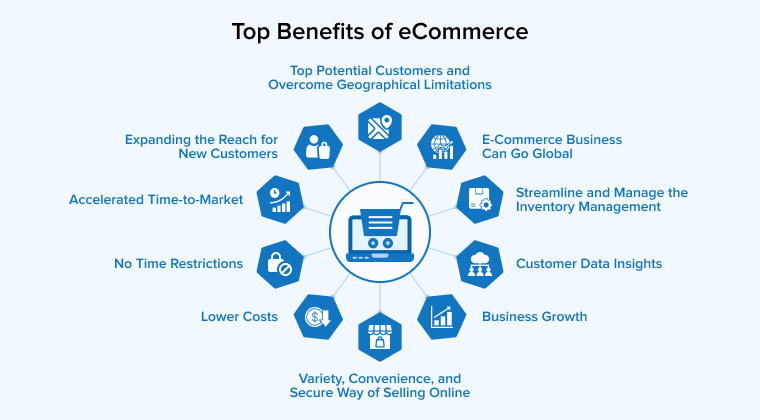The Benefits of E-commerce: Empowering Businesses in the Digital Age
E-commerce has revolutionized the way businesses operate, providing numerous advantages that traditional brick-and-mortar stores simply cannot match. In this article, we will explore the benefits of e-commerce and how it can help businesses thrive in the digital age.
Increased Reach and Global Market Expansion
One of the key benefits of e-commerce is the ability to reach a global audience. Unlike physical stores, e-commerce websites are not limited by geographical boundaries. With a well-optimized e-commerce platform, businesses can expand their customer base beyond their local market, tapping into new markets around the world.
By leveraging the power of search engine optimization (SEO) and digital marketing strategies, e-commerce websites can rank higher in search engine results, attracting more organic traffic and potential customers. This increased visibility can lead to greater brand recognition and improved sales opportunities.
24/7 Availability and Convenience
Unlike traditional stores with fixed operating hours, e-commerce websites offer the convenience of 24/7 availability. This means customers can browse and make purchases at any time, from anywhere in the world. This flexibility is particularly advantageous for businesses targeting international customers across different time zones.
Furthermore, e-commerce eliminates the need for customers to physically visit a store, saving them time and effort. With just a few clicks, customers can explore a wide range of products, compare prices, read reviews, and make informed purchase decisions. This convenience enhances the overall customer experience and encourages repeat business.
Lower Overhead Costs and Increased Profit Margins
Operating an e-commerce business typically requires lower overhead costs compared to traditional brick-and-mortar stores. Without the need for a physical storefront, businesses can save on expenses such as rent, utilities, and maintenance. Additionally, e-commerce allows for streamlined inventory management, reducing the need for extensive warehousing and storage space.
Moreover, e-commerce businesses can benefit from economies of scale by reaching a larger customer base without incurring significant additional costs. This scalability allows businesses to increase their profit margins and reinvest in growth strategies.
Personalization and Targeted Marketing
E-commerce platforms enable businesses to gather valuable customer data, such as browsing history, purchase behavior, and demographic information. This data can be leveraged to personalize the shopping experience, making product recommendations and offering tailored promotions to individual customers.
Furthermore, e-commerce websites can implement targeted marketing campaigns based on customer segmentation. By analyzing customer preferences and behavior, businesses can create highly effective marketing strategies that resonate with their target audience, leading to increased conversion rates and customer loyalty.
Efficient Order Fulfillment and Inventory Management
Efficient order fulfillment is crucial for customer satisfaction and retention. E-commerce platforms offer advanced inventory management systems that can automate order processing, track inventory levels in real-time, and facilitate seamless shipping and delivery.
By integrating with logistics partners and adopting efficient fulfillment strategies, e-commerce businesses can ensure timely and accurate order fulfillment, minimizing the risk of stockouts or delayed deliveries. This reliability enhances customer trust and helps build a strong reputation in the market.

E-commerce has truly transformed the business landscape, offering unparalleled opportunities for growth and success. By embracing e-commerce, businesses can expand their reach, increase convenience for customers, reduce costs, personalize marketing efforts, and streamline order fulfillment processes.
To fully leverage the benefits of e-commerce, businesses must adopt a comprehensive digital marketing strategy, optimize their websites for search engines, and provide exceptional customer experiences. With the right approach, businesses can position themselves ahead of the competition and thrive in the digital age.
Frequently Asked Questions about the Benefits of E-commerce
1. What is e-commerce?
E-commerce refers to the buying and selling of goods and services over the Internet.
2. What are the advantages of e-commerce?
E-commerce offers several benefits such as:
Convenience of shopping from anywhere and anytime
Access to a wide range of products and services
Lower prices due to reduced overhead costs
Ability to compare prices and read reviews before making a purchase
Faster and more efficient transactions
3. How does e-commerce benefit businesses?
E-commerce provides businesses with:
Global reach and the ability to target a wider customer base
Lower operational costs compared to physical stores
Opportunity to personalize marketing and offer personalized recommendations
Access to valuable customer data for better decision-making
Ability to provide 24/7 customer support
4. Can e-commerce help small businesses?
Yes, e-commerce can greatly benefit small businesses by:
Leveling the playing field with larger competitors
Reducing the need for a physical storefront and associated costs
Reaching a global audience without geographical limitations
Offering cost-effective marketing and advertising opportunities
Increasing visibility and brand awareness
5. Is e-commerce secure?
Yes, e-commerce platforms employ various security measures to ensure safe transactions, such as:
Secure socket layer (SSL) encryption for data protection
Secure payment gateways to safeguard financial information
Authentication and authorization protocols
Fraud detection and prevention systems
Regular security audits and updates
6. What are the environmental benefits of e-commerce?
E-commerce can contribute to a more sustainable future by:
Reducing the need for physical stores, thus saving energy and resources
Minimizing paper waste through digital transactions and receipts
Encouraging eco-friendly packaging and shipping practices
Promoting virtual meetings and telecommuting, reducing carbon emissions
Supporting the growth of green technologies and renewable energy
7. Can e-commerce help in expanding market reach?
Absolutely! E-commerce allows businesses to expand their market reach by:
Reaching customers beyond geographical boundaries
Targeting niche markets and specific customer segments
Utilizing digital marketing strategies to reach a wider audience
Establishing partnerships with other online platforms for increased exposure
Exploring international markets without the need for physical presence
8. How does e-commerce improve customer experience?
E-commerce enhances customer experience through:
Convenient and user-friendly online shopping interfaces
24/7 availability and accessibility
Personalized product recommendations and tailored offers
Efficient order tracking and delivery notifications
Easy returns and refund processes
9. What are the social benefits of e-commerce?
E-commerce brings several social benefits, including:
Providing opportunities for small businesses and entrepreneurs
Creating jobs in areas such as online marketing, logistics, and customer support
Enabling individuals to start their online businesses
Supporting charitable organizations through online fundraising
Facilitating access to goods and services for people with limited mobility
10. How can e-commerce contribute to business growth?
E-commerce can drive business growth by:
Expanding customer base through increased visibility and accessibility
Generating higher sales and revenue
Creating opportunities for upselling and cross-selling
Building customer loyalty through personalized experiences
Allowing businesses to scale operations without significant infrastructure investments




